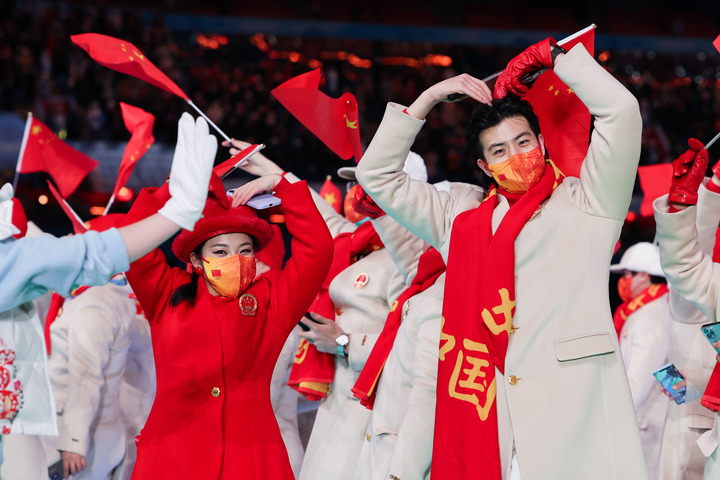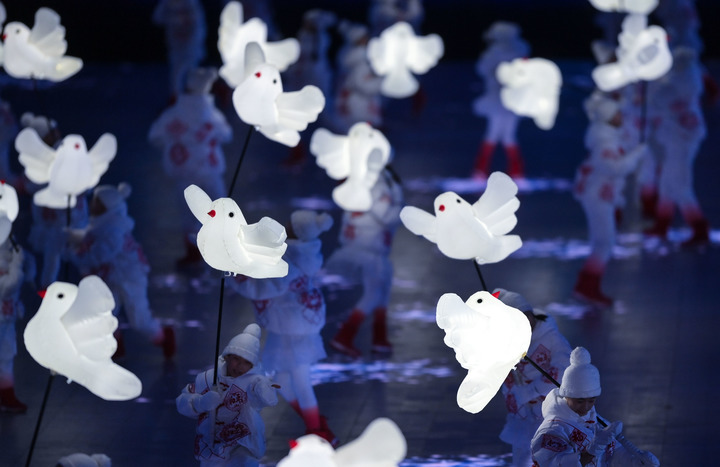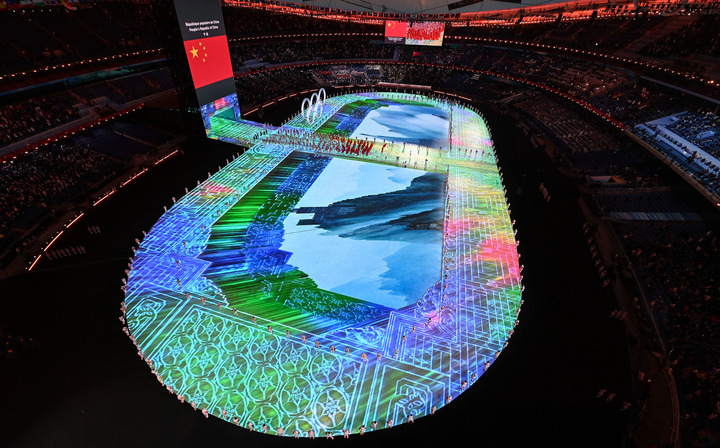
The Olympic delegation of the People's Republic of China parade into the National Stadium during the opening ceremony of the Beijing 2022 Olympic Winter Games in Beijing, capital of China, Feb. 4, 2022. [Photo by Cao Can/Xinhua]
The smiles of athletes light up Beijing 2022.
BEIJING, Feb. 5 (Xinhua) -- When the giant snowflake, inscribed with names of all participating countries and regions, rose up in the Bird's Nest on Friday night, the flame at its center symbolized the beginning of the 2022 Beijing Olympic Winter Games.
The smiling faces of athletes from across the world at the grand opening ceremony showed that they were ready to enjoy the sports gala.
It is already a great success for China to make it happen as scheduled against all odds, in spite of doubts and criticism during the preparation, including concerns about air quality, artificial snow, COVID-19 pandemic, etc.
Beijing is the only dual-Olympic city which hosts both the Summer and Winter Olympics, of which some Western media have expressed worries for the shortage of snow, and then for the quality of artificial snow.
But when Phil Bellingham arrived at the venue, the Australian cross-country skier was satisfied.
"It's super consistent and firm snow, which works for me as I'm more of a big bodied skier," he told a press conference earlier this week.
"The course is really good, the snow is really good," said his teammate Seve de Campo.
In fact, competition snow requires a higher density than recreational snow in order to meet the requirements of the International Ski Federation and to ensure conditions are consistent and fair for each competitor.
Artificial snow was first used at the 1980 Lake Placid Olympic Winter Games. Around 90 percent of snow used at the Alpine skiing venue for the PyeongChang 2018 Winter Olympics was artificial, while man-made snow was also a feature of Vancouver 2010 and Sochi 2014.
Beijing 2022 organizers have vowed to deliver a sustainable and eco-friendly event. This principle not only applies to snow-making, but is also shown in the constant improvement of air quality.
Beijing's average concentration of PM2.5 was 33 micrograms per cubic meter in 2021, the lowest level since records began in 2013. The city saw 288 days of good air quality last year, up by 112 days from 2013.
David Vance Wagner, from the U.S. State Department's Office of the Special Envoy for Climate Change, tweeted last month: "Incredible: Beijing gov't has announced that the city met China's air quality targets for all 6 key pollutants in 2021. Extraordinary progress that was almost unimaginable 10 years ago."

Artists perform during the opening ceremony of the Beijing 2022 Olympic Winter Games at the National Stadium in Beijing, capital of China, Feb. 4, 2022. [Photo by Xue Yuge/Xinhua]
Another obstacle is the the lingering COVID-19 pandemic, which has claimed more than five million lives across the world.
China, with its population topping 1.4 billion, is tackling the issue well with a closed-loop system in place for the Winter Olympics. It is held in Beijing, whose population is nearly that of Australia, which is still battling with COVID-19 with tens of thousands of cases reported daily.
"The reality is that every country in the world at the moment has a higher level of COVID [cases] than China does. So that means people coming in are traveling from a high level of COVID [risk] to a low level," said Dr. Brian McCloskey, chief of the Beijing 2022 Medical Expert Panel.
The Beijing Olympic Winter Games has brought together about 2900 athletes from 91 countries and regions.
"Not a lot of countries would be able to host the Olympics during a pandemic. It's something that only strong countries can actually achieve," said Sandrine Nduwimana of the China-Africa Business Council, who has lived in China for more than 14 years.
Alessandro Golombiewski Teixeira, a professor at Tsinghua University who moved to Beijing from the United States three years ago, said China is giving an example of a safe Winter Olympics. "China took all the precautions. It did the impossible," he said.
Despite the so-called diplomatic boycott led by a few Western countries, the sporting gala attracted more than 30 international dignitaries from across the world, including heads of state, heads of government, members of royal families and heads of international organizations.
This gathering of leaders during a time of COVID-19 showed the support of the world for the Olympics, as well as their wish for unity.

Athletes parade into the National Stadium during the opening ceremony of the Beijing 2022 Olympic Winter Games in Beijing, capital of China, Feb. 4, 2022. [Photo by Song Yanhua/Xinhua]
During the opening ceremony, Thomas Bach, president of the International Olympic Committee, expressed his gratitude to China. "Thank you for making these Olympic Winter Games happen - and making them happen in a safe way for everyone," he said.
"In our fragile world, where division, conflict and mistrust are on the rise, we show the world: yes, it is possible to be fierce rivals, while at the same time living peacefully and respectfully together."
The cauldron was lit and the stage was set. In the following two weeks, athletes from around the world will enjoy, compete and exchange with each other and make friends under the Olympic rings in Beijing.
A new chapter of history will be written and more victories will be achieved. Many years later, when the Beijing Olympic Winter Games is mentioned, people will say, "Yes, I remember it."
"It was a very difficult time and China managed to defeat all the difficulties to make it happen," perhaps they will say. "It showed the world that no matter what, unity is possible, if you are only willing to give it a chance."

 中文
中文



